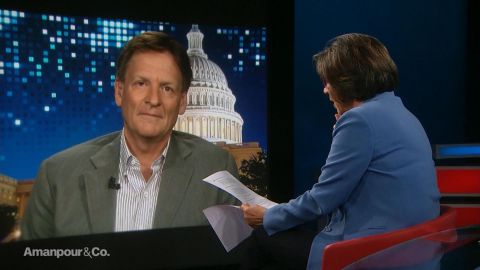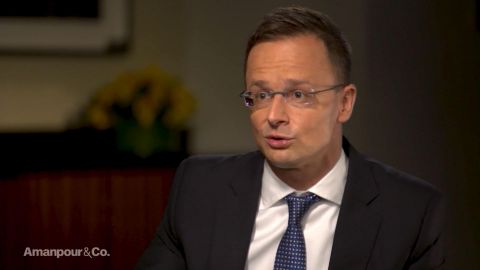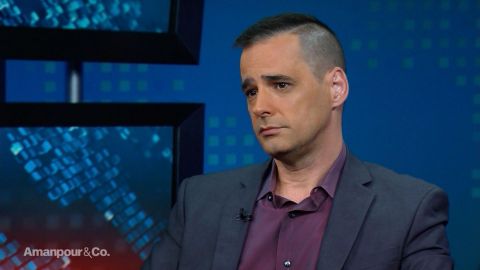Read Transcript EXPAND
MICHEL MARTIN: Larry Ward, thank you so much for joining us.
LARRY WARD, CHIEF MARKETING OFFICER, GUN DYNAMICS: Thanks for having me.
MARTIN: So let’s just start with Gun Dynamics. You’re grazing money to do what?
WARD: We’re helping gun inventors and gun manufacturers raise money to bring products to market. Really interesting products, new inventions in the gun space.
MARTIN: And what?
WARD: We have a couple of — we have one we just closed. It’s a trigger for the ST1911. It’s an adjustable trigger, helps, you know, keep the —
MARTIN: Different people can fire it and be comfortable, is that it?
WARD: Absolutely.
MARTIN: Like adjustable —
WARD: Absolutely. Right. Just adjustable triggers for the finger length. Our founder Larry Lopata took this to a crowdfunding platform and got kicked off and they went to another crowdfunding cap platform and got kicked off. And eventually he, you know, I can honestly say we need to build a crowdfunding platform for the guns.
MARTIN: So do your own thing?
WARD: Yes.
MARTIN: So the goal, it seems to me, is to make more guns available to more people. Is that right?
WARD: Well, it’s to — this is actually to help bring gun technology and, you know, bring technology from an accuracy perspective, from a scope, from hunting, from — you know, there are lots of different products. And, you know, quite frankly, the inventors don’t have access to capital to bring these things to market.
MARTIN: So, you know, the reason I’m curious about why you say that is that there are what, some 300 million guns already in circulation in the United States. So it doesn’t seem to me that there’s any shortage of guns here.
WARD: No, but there’s not a shortage of knives either. You know, occasionally you want to buy a new set of steak knives or there’s not a shortage of cars but you buy a new car occasionally. So, you know, and there are people turning, you know, 18, 19, 20 who want to arm themselves. So there’s always a need for having new, inventive, intelligent guns.
MARTIN: Most industries try to meet multiple demands of the market, particularly something like the auto industry, right. The auto industry is always trying to come up with ways to make driving more fun and more sexy and more exciting but they also try to meet the demand for safety. I don’t see your company doing that. I don’t see the industry doing that.
WARD: Of course —
[CROSSTALK]
WARD: No, no, no. That’s not true at all. I mean there — you know, there are — gun manufacturers go — as a matter of fact, if you know any gun owner or people who manufacture guns or sell guns, safety is always on —
MARTIN: Safety for whom though? Safety for the shooter? Safety for the people around?
WARD: Safety for the shooter, safety for people who surround them. Part of the problem is you’ve got a lot of people with good ideas coming up with different ways to bring products and services to market, whether it be recreational, whether it be hunting, whether it be safety, right. And these — the banks and the financial institutions, particularly the bigger banks that have very liberal boardrooms are not giving them access to take these inventions to market.
MARTIN: Well, give me a sense though of what sense of responsibility you feel to the rest of the public.
WARD: Sure.
MARTIN: A lot of people in this country with lots of different points of views about guns, right. And you’ve got some people who feel really strongly about their guns and feel that they’re an important part of their sense of self, their citizenship, their responsibilities. You’ve got other people who are desperately afraid and really feel that something has kind of changed in this society where kids aren’t even able to go to school without being, you know, without having to have like active shooter drills and being afraid of being shot. Do you feel any responsibility to meet those citizens somewhere?
WARD: I would suggest anybody who’s afraid of guns should go out to a range, should learn how to fire a gun, should realize that it’s not as scary as it looks. And that it can be held responsibly, it can be held lawfully, and it can be used to protect yourself and your loved ones.
MARTIN: We don’t take that approach to other things that harm people even if used correctly or incorrectly. Like opioids for example. I mean opioids have had tremendous benefit to society but they also kill people. So we don’t just say, “You know what, this is a good thing. We’re going to trust you to use it.” We regulate those things. We regulate all kinds of things that are a benefit to society that can also harm them.
WARD: But we don’t —
MARTIN: Why shouldn’t this be the case with guns?
WARD: We don’t have a constitutional amendment that says, “Opioid use shall not be infringed.” [13:45:00] We have a Second Amendment that is there for a very very good reason that most people don’t truly understand.
MARTIN: Well, the Second Amendment is really — we can recite it together, shall we? You know, a well regulated Militia being necessary for the security of a free State, the right of the people to keep and bear Arms, shall not be infringed. You belong to a Militia.
WARD: What it’s saying is we need a military to keep — we need a Militia to protect from invasion so it’s necessary for a free state. And the second part of it is that’s why we need the citizens to have guns because it’s not just for, you know, for the military and for the state to have the guns, for the government to have the guns, it’s for the citizens to keep the government in check. You know, and for — if we, all of a sudden elect a tyrant, you know, and a tyrant goes out and starts acting tyrannical and taking away our other rights and yelling people for political purposes or whatever it is, we have the right to remove that person by force. And we can’t do that if we don’t have an armed society.
MARTIN: Is there any — I don’t know what word to use here. I’ll just use the word restriction on ownership or access to guns that you would be prepared to accept?
WARD: Well, there are restrictions, you know. There’s restrictions on automatic weapons. There have been restrictions on those for, you know, a hundred years, advocating that we overturn that. I believe that any gun that the government engages its citizens with, any weapon that the government engages citizens with, the citizens have the right to own and possess. And to this date, the American government has not engaged us with automatic weapons so I see no need for us to have automatic weapons. But I was walking out here in New York City, a police officer carrying an AR15s and there’s nothing wrong with the American people using an AR15, a semiautomatic weapon.
MARTIN: I was looking at your Web site as I said is your newsletter as it were. And these are the recent headlines, Corporations are Diving into Leftist Politics, Heavily Armed Illegals Cross the Border, Man Arrested in his Own Backyard. You know, most of the Go Fund Me sites that I look at are like, “Hey, that’s great. Let’s put on this record.” Yours is very much, “They’re out to get me” like out to get you.
WARD: Well, of course, they are. The corporations are engaging leftist politics. Citibank recently released a policy that they won’t allow gun purchases without a background check and try to advertise for a gun. Or on Google, on Facebook, on any kind of social media or Internet platform, 99 percent of them don’t let you advertise for guns or gun parts.
MARTIN: And yet somehow there are still 300 million guns in this country – –
WARD: Because there are still gun stores and they don’t know where to get them.
MARTIN: Exactly.
WARD: Right. But that doesn’t mean — no, that’s an unfair business practice, right. There are a lot of coffee shops but if only Starbucks gets to advertise, is that unfair? That’s unfair. You can advertise gun control on Google. You can advertise gun control on Facebook and Twitter, no problem. You can’t advertise for gun rights. You can’t advertise for gun parts or ammunition or anything else. So these businesses need to get their message out to the people and that’s why Gun Dynamics.
MARTIN: Talk to me a little bit about yourself if you would. You’re from New York.
WARD: I’m from New York.
MARTIN: Born and raised?
WARD: Born and raised.
MARTIN: From Long Island.
WARD: Long Island.
MARTIN: Did you grow up with a gun in the house?
WARD: I did not. I actually grew up in — you know, Long Island, New York is not a big gun culture community.
MARTIN: So how did you get introduced to guns?
WARD: Well, you know what, I’m not an outdoorsman. I’m not a hunter but what got me interested in guns was the Constitution. You know, I started looking at well, why is the second amendment here and it makes a lot of sense. We have to protect ourselves from an out of control government. We have to protect ourselves from invaders. We have to protect ourselves from people who would want to do us harm. And, you know, guns are our tool.
MARTIN: Well, how old were you when you got your first gun?
WARD: In my 30s.
MARTIN: In your 30s.
WARD: Yes, moved out of Virginia.
MARTIN: So how come?
WARD: Why did I buy my first gun?
MARTIN: Yes.
WARD: To protect my family.
MARTIN: If I understand it, you are a person — in fact, I think you claim credit for arming the teachers. At least that is a phrase, right.
WARD: Yes.
MARTIN: As I understand the story that in the wake of the shooting in Newtown, Connecticut. Am I right about that?
WARD: Right.
MARTIN: There was a —
WARD: There was a protest coming from —
MARTIN: Protest coming from —
WARD: And my office was in between the NRA lobby office and the RNC. And they were coming down the street screaming “Shame the NRA” two days after Newtown and I lifted up my window because, you know, I have children, right. And I don’t see school safety the way they do and they’re screaming shame the NRA like they’re — you have signs with — you know, you have blood on your hands and stuff like that. I don’t see it that way. And so I lifted up the window and I screamed on the teachers because the only way to prevent the school shooting is to have armed guards or armed teachers or armed principals. People who are — not everybody. You’re not mandating people but having people who want to be armed in a way to defend their students, to be able to do it, not a gun free zone, to be able to defend and shoot. The principal in Newtown who bravely confronted the shooter and was killed. If he had bravely confronted the shooter and shot him, it had been a different story.
MARTIN: So then, forgive me, because this is such an awful construction in a situation like that where there’s so much loss of life. So I’m going to apologize in advance for our language. Whose fault was that?
WARD: Well, it’s the shooter’s fault. It’s the only person’s fault that is. You know, I’m not even going to go as far as to say that the politicians who made it a gun free zone, it’s not their fault. It’s the shooter’s fault. It’s not a policies fault. It’s not a tools fault, it’s the shooter’s fault.
MARTIN: You know, people make mistakes too but we don’t say, “You know what, there’s nothing I can do about that.” Like if an airplane crash, we don’t say —
WARD: Right. But what we can do about it — there’s lots we can do.
MARTIN: How can this be safer?
WARD: So let’s make schools safer. Let’s reinforce the doors. Let’s have better security on staff. Let’s have armed guards. Let’s have places where, you know, the school doors where they close the door and maybe it’s locked and reinforced with steel. There’s lots of things that we can do to help protect kids in the future from this happening again.
MARTIN: So the bottom line is for you, Larry, you’re not willing to change anything about your lifestyle and your access to guns not, not just you personally but others, people who agree with you, you’re not willing to do anything?
WARD: But in terms —
MARTIN: All the change needs to be elsewhere, outside of you? And I’m asking you as a citizen in this country —
WARD: Right.
MARTIN: — as a person who — you know, other people have a stake in the society too.
WARD: I say that gun control causes more deaths than gun — than actually gun rights and having the ability to defend oneself and one family and that’s, you know, proven. In the areas that have the strictest gun control, we have elevated gun violence. Chicago is a war zone but regular, you know, good, responsible citizens can’t get guns.
MARTIN: So, Larry, one of those kids who saw their friends get shot in Parkland, Florida, right, whether or not they’ve ever shot a gun before because some of those kids have.
WARD: Right.
MARTIN: Their parents have guns for whatever reason. And you saw their friends get shot, are you really prepared to tell them that that is not — that the level of mass shootings in this country is acceptable?
WARD: But it’s a personal story. I’m not crass. I’m not going to make somebody feel bad but there are gun rights folks that came out of Parkland who are still talking about their right to defend themselves and talking about arming teachers and talking about, you know, commonsense gun rights legislations, and other ways to protect kids in the schools. And there are plenty of families from these incidents who see things our way. They don’t get their story told in the say — at the same level. So I’m not going to tell David Hogg or any of his friends, you know, that their pain isn’t real because it is real and their emotions are real. And I’d stand by their right to fight for what they believe in. But what I will say to them is, you know, open your minds and if you really truly are interested in saving more lives, look at the other opportunity. Look at the ability to have an armed guard on campus and look at some other ways that we can keep our school safe.
MARTIN: And what about you? Have you ever considered that they might be right? Have you ever allowed yourself —
WARD: Of course.
MARTIN: — to consider that they might be right?
WARD: Of course. I listen to both sides of the argument. And I’ll have this conversation so I have been thoughtful of the other side. The problem is the logic doesn’t pan out.
MARTIN: What does society look like five years from now?
WARD: What I see right now, the fight that’s going to continue five years from now, is in the free market. And I believe that the only way to battle the free market is with the free market and that brings us back to companies like Gun Dynamics. It’s not just going to be Gun Dynamics, there will be other companies that are going to be out there to offer solutions to go around these big corporate monsters. And, you know, make sure that they can provide their goods and services and their products and their inventions, bring them to the marketplace.
MARTIN: Larry Ward, thanks so much for joining us.
WARD: Thank you.
MARTIN: Appreciate it.
WARD: Appreciate it.
MARTIN: Thank you for coming.
About This Episode EXPAND
Christiane Amanpour interviews Michael Lewis, author of “The Fifth Risk: Undoing Democracy,” “Moneyball,” & “The Big Short;” and Peter Szijjarto, the Hungarian Foreign Minister. Michel Martin interviews Larry Ward, the Chief Marketing Officer at Gun Dynamics.
LEARN MORE


